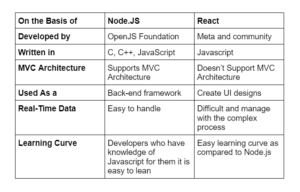Node.js and React.js are both popular JavaScript technologies, but they serve different purposes in web development. Node.js is a server-side runtime, while React.js is a JavaScript library for building user interfaces. To determine which technology might land you a job more quickly, it’s essential to consider the specific roles and demands in the job market.
Node.js:

Use Cases:
- Server-Side Development: Node.js is primarily used for server-side development. It allows developers to build scalable and high-performance server applications using JavaScript.
- API Development: Node.js is commonly used to create APIs (Application Programming Interfaces) that connect the front end with the server.
- Real-Time Applications: Node.js is well-suited for building real-time applications, such as chat applications or online gaming platforms.
Jobs:
- Backend Developer
- Node.js Developer
- Full-Stack Developer
React.js:

Use Cases:
- User Interface (UI) Development: React.js is mainly used for building user interfaces. It enables developers to create interactive and dynamic web applications with a component-based architecture.
- Single Page Applications (SPAs): React.js is commonly employed in building SPAs where the entire application runs on a single web page, offering a smoother user experience.
- Reusable Components: React.js promotes the creation of reusable UI components, making it easier to maintain and update large-scale applications.
Jobs:
- Frontend Developer
- React Developer
- UI/UX Developer

Factors to Consider:
- Job Market Trends: Research current job market trends to understand the demand for Node.js and React.js developers in your region or the industry you are interested in.
- Your Interests and Skills: Consider your personal interests and skills. If you enjoy working on the server side and handling backend logic, Node.js might be a good fit. If you’re more interested in creating interactive and dynamic user interfaces, React.js might be the better choice.
- Full-Stack Development: Some job opportunities may require proficiency in both Node.js and React.js, especially for full-stack developer roles. Learning both technologies could broaden your job prospects.
- Industry-Specific Requirements: Some industries or projects may have specific technology requirements. For example, a company working on real-time applications might prioritize Node.js, while a company focused on UI/UX may prefer React.
- Continuous Learning: Both Node.js and React are valuable skills, and the tech industry is dynamic. Being open to continuous learning and staying updated on industry trends will benefit your career in the long run.
Ultimately, the choice between Node.js and React.js depends on your career goals, interests, and the specific job market in your region. It’s also worth noting that many web developers today work with both technologies as part of full-stack development.
It’s challenging to declare a clear winner between Node.js and React because they serve different purposes in web development. The choice between them often depends on whether you are interested in server-side development (Node.js) or building user interfaces (React.js).
However, if the goal is to optimize for landing a job quickly, React.js may have a slight advantage. The demand for front-end developers, especially those with expertise in React.js, has been consistently high. Many companies are actively seeking React.js developers to create dynamic and responsive user interfaces for their web applications.
In the context of quickly securing job opportunities, focusing on React might offer a more direct path to front-end development roles. That said, the best choice ultimately depends on your interests, career goals, and the specific job market trends in your region. If you are interested in full-stack development, gaining proficiency in both Node.js and React.js can enhance your overall employability.
